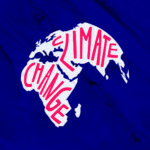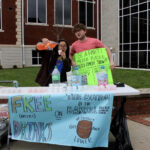by Matthew Pertz, News Editor
The climate is changing, predominantly because of human meddling and pollution. The effects of these atmospheric shifts are already being felt, and will worsen exponentially in coming years. Humanity faces an imminent existential threat of our own creation.
I’m laying these facts out as a doormat so the enormity of this problem can be understood first. Environmental debates are plagued by a dangerous form of relativism, where some argue a fact is only true if I, as the protagonist of My Universe, deem it to be true.
Unfortunately, the truth doesn’t care how you feel about it. The Intergovernmental Panel on Climate Change (IPCC), the authoritative body on global warming, wrote in its 2014 report, “Warming of the climate system is unequivocal…. Some of these changes have been linked to human influences.”
Climate change is more than record high temperatures and less snow; new studies are revealing that environmental issues are also a pathway to institutional racism and deadly consequences for the impoverished.
A 2016 study from Environment International found evidence that “segregation is broadly associated with disparate air pollution exposures. Disproportionate burdens to adverse exposures such as air pollution may be a pathway to racial/ethnic disparities in health.”
The IPCC reached the same conclusion three years earlier: “Climate change will amplify existing risks and create new risks for natural and human systems. Risks are unevenly distributed and are generally greater for disadvantaged people and communities in countries at all levels of development.” Professor Pepijn Luijckx of the University of Toronto found more specific consequences, stating, “Rising temperatures due to global warming can alter the proliferation and severity of infectious diseases, and this has broad implications for conservation and food security.”
Yet the narrative of environmental issues is normally pitting the feelings of environmentalists against the benefit of the overall economy, saving trees versus saving jobs. The debate caves when framed as either preserving the health of the least privileged or helping corporations make more money.
America already chose to remain with the business class. Most recently, lobbyist Andrew Wheeler was nominated for deputy administrator of the Environmental Protection Agency after spending his private sector career advocating against environmental protection. He also previously served as an aide to Sen. James Inhofe (R-Okla.), who is best known for bringing a snowball into the Senate chamber as proof the atmosphere wasn’t warming.
The New York Times published a list of 67 EPA regulations being rolled back by the current EPA, led by Scott Pruitt, most as a result of direct pressure from corporations. An anonymous spokeswoman for the EPA said reviewing these rules would eradicate anything that would “impose unwarranted burdens or exceed our statutory authority.”
The agency’s obligation to alleviate those “unwarranted burdens” seems to apply exclusively to afflicted businesses, not people. A 2015 investigation by the Center for Public Integrity found the agency received 265 complaints of environmental discrimination in 22 years, yet only opened 13 investigations, all of which are still open today. All of this is especially striking considering the EPA is required to respond to any complaint within 20 days, and yet most of the 13 complaints have been open for over ten years.
The problematic priorities of the EPA exist independent of political party; Americans have chosen to protect the almighty Dollar instead of our only home. With climate change reaching an irreversible point, public officials must be resolute in protecting the environment, both for the sake of the lower class now and for the whole of humanity in the foreseeable future.







